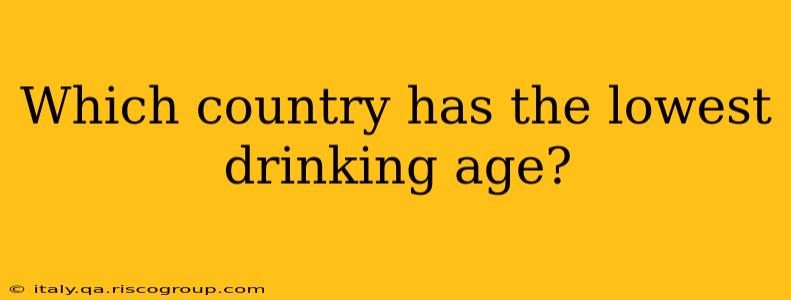The legal drinking age varies dramatically across the globe, reflecting diverse cultural norms, public health concerns, and historical influences. While many countries maintain a minimum drinking age of 18 or 21, some allow alcohol consumption at significantly younger ages. This post explores countries with the lowest drinking ages and delves into the complexities surrounding these laws.
Understanding the Global Landscape of Drinking Ages
Before identifying the countries with the lowest drinking ages, it’s crucial to understand the nuances involved. The legal drinking age isn't always straightforward. Some countries might permit alcohol consumption at a younger age with parental consent or in specific contexts, such as religious ceremonies or family meals. Others might have no minimum age but regulate the sale and purchase of alcohol.
Furthermore, enforcement of these laws varies considerably. Strict regulations and heavy penalties are common in some countries, while others have a more lenient approach, leading to a less consistent reality than the legal framework suggests.
Countries with Relatively Low Drinking Ages
Pinpointing the country with the absolute lowest drinking age is difficult due to the aforementioned inconsistencies and variations in enforcement. However, several countries stand out as having lower drinking ages than the widely adopted 18 or 21:
Niger
Niger is often cited as having one of the lowest, if not the lowest, drinking age globally. While the precise legal framework is complex and may vary depending on the specific type of alcohol, the lack of stringent age restrictions allows for relatively easy access to alcohol for minors. It's important to note that this does not imply widespread acceptance or social approval of underage drinking.
Other Countries with Low or Flexible Drinking Ages
Several other countries have relatively permissive alcohol laws, though the exact specifics often differ:
- Many African Countries: A number of African countries have less restrictive alcohol laws compared to Western nations. However, access and consumption patterns are significantly impacted by cultural norms, economic factors, and availability. Researching specific countries within the African continent is necessary for accurate information.
- Some European Countries: While many European countries align with a minimum drinking age of 16 or 18, some exhibit more nuanced regulations. Specific details need to be investigated on a country-by-country basis.
The Complexities and Consequences of Low Drinking Ages
The existence of low drinking ages highlights the complex interplay between legal frameworks, cultural attitudes, and public health. Countries with lower drinking ages often contend with higher rates of alcohol-related harm among young people, including:
- Increased risk of alcohol dependence: Early exposure to alcohol can increase the likelihood of developing alcohol use disorder later in life.
- Higher rates of alcohol-related injuries and deaths: Young people are more susceptible to the negative consequences of alcohol consumption due to their still-developing brains and bodies.
- Negative impact on academic performance and social development: Excessive alcohol consumption can interfere with education, relationships, and overall well-being.
Conclusion: More Than Just a Number
The legal drinking age is not merely a number; it represents a society's approach to alcohol and its potential impact on its population, particularly its youth. While some countries have lower drinking ages, understanding the associated risks and societal consequences is essential. Further research into the specific regulations and cultural contexts of individual countries provides a more complete picture than simply identifying the lowest number. The global landscape of alcohol laws is a constantly evolving field, requiring ongoing attention and critical analysis.

